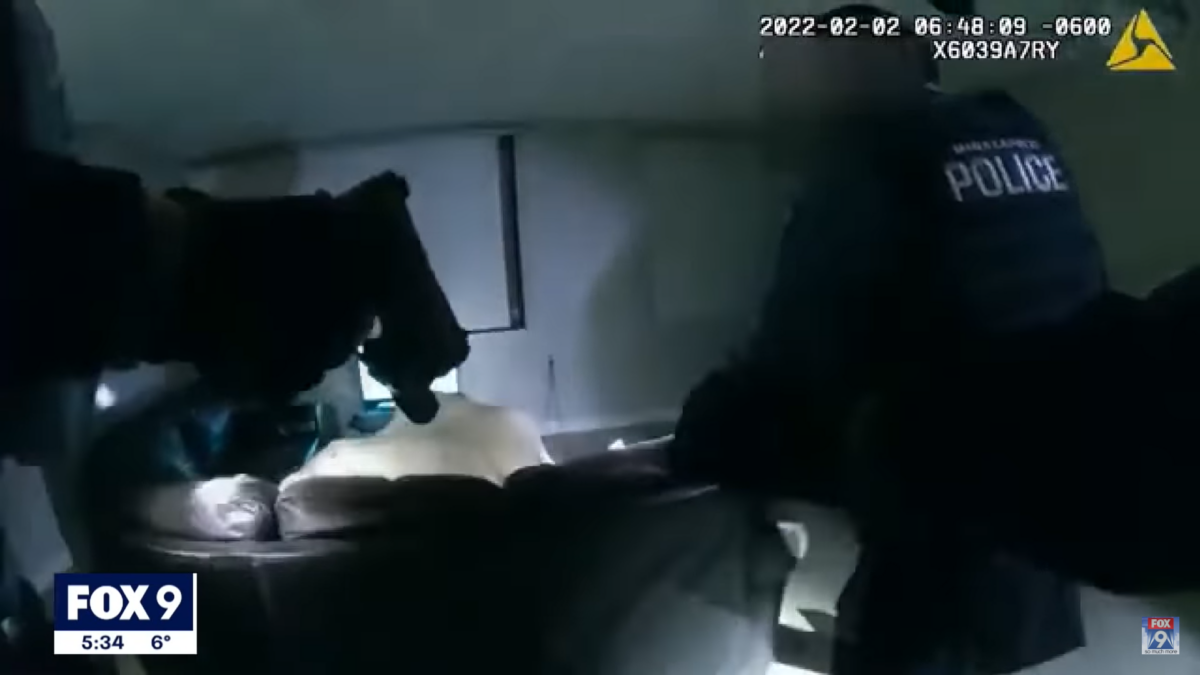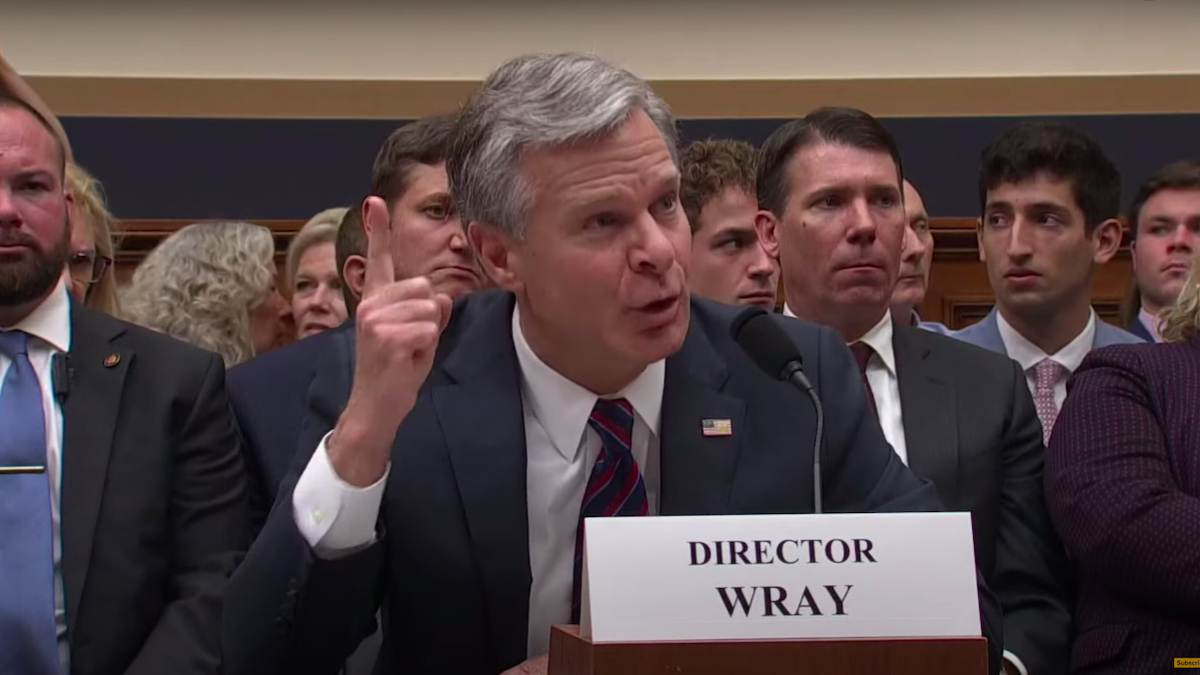The killing of Amir Locke in a no-knock police raid last week in downtown Minneapolis was a tragedy, but it was also an abject abuse of police power. New details are still coming to light, but no new information will change the plain fact that a SWAT team should never have barged in on the 22-year-old Locke, who was asleep, and then shot him dead when he understandably reached for his legally owned handgun.
I’ll put it bluntly: every American has a right to defend himself from an intruder, even if the intruder turns out to be police conducting a no-knock raid. The Locke case demonstrates what an abject violation of the Fourth Amendment no-knock raids are, and why they should be outlawed in every state.
Here’s what we know about the Locke case so far. News broke Tuesday that St. Paul Police arrested a homicide suspect in the investigation that last week led to the fatal shooting of Locke. The suspect is 17-year-old Mekhi Camden Speed of Minneapolis, who according to charging documents is Locke’s cousin. Speed has been charged with two counts of second-degree murder for the killing of 38-year-old Otis Elder last month in what appears to have been a drug deal.
Police were looking for Speed after his fingerprints were lifted from a stolen vehicle, recovered in late January, connected to the murder of Elder. The search for Speed led police to conduct early morning, no-knock raids on three apartments in downtown Minneapolis. Locke was in one of those apartments, asleep on the couch when a SWAT team burst through the door, guns drawn, shouting “Police! Search warrant!”
Graphic body cam footage shows an officer kick the back of a couch where Locke is asleep under a blanket. As he rolls off the couch, a gun becomes visible and police immediately fire at least three shots, killing Locke. The whole thing is over in about five seconds.
Locke legally owned the gun and had a permit to carry it, according to his family. We don’t yet know why he was sleeping in this apartment, but we do know that police were not looking for him. Investigators have said they were looking for Speed and two other suspects, not Locke.
But we do know, or should know, this: Locke’s father, Andre Locke, was absolutely right when he said his son “never even got the chance to get the cover off his head. He was startled. He did what any reasonable law-abiding citizen would do. White or black.”
The case has understandably drawn comparisons to Breonna Taylor, whom police fatally shot in a midnight raid in March 2020. Taylor’s boyfriend, Kenneth Walker, a licensed gun owner, woke up to the sound of repeated pounding on the front door. He, too, did what many people would have done: he grabbed his gun.
Walker and Taylor called out, asking who was there, but received no answer. Walker later said he thought they were being attacked, possibly by Taylor’s ex-boyfriend. When plainclothes police officers broke the door off its hinges, Walker fired at them, not knowing they were police. Officers responded with a hail of at least 20 bullets, striking Taylor multiple times and killing her.
Just as in the Locke case, police were not looking for Taylor when they raided her home.
These and many other high-profile cases in recent years have called into question the use of no-knock police raids. Following the release of the body-cam footage in the Locke shooting, Minneapolis Mayor Jacob Frey announced a moratorium on no-knock raids pending an investigation (with an exception for “imminent threat of harm” of police officers).
That’s a good start, but no-knock raids should be scrapped altogether — and there’s a compelling constitutional case for doing just that. In the 1995 U.S. Supreme Court case Wilson v. Arkansas, the court recognized that something called the “Castle Doctrine” and the “knock and announce” rule are embedded in the Fourth Amendment. The idea is that our protections from unreasonable search and seizure mean that police must knock, announce themselves, and give residents time to answer before they enter forcibly.
But here’s the hitch. The Wilson ruling allowed that in cases with “exigent circumstances,” police can enter without knocking if it means a suspect might be able to escape or destroy evidence. That exception prompted many police departments to simply declare in all search warrant affidavits that a no-knock raid was justified, citing the danger of a suspect fleeing, destroying evidence, or assaulting the officers serving the warrant.
That in turn lead to another Supreme Court ruling in 1997, Richards v. Wisconsin, which found that blanket exceptions to the “knock and announce” rule were unconstitutional. The ruling, written by Justice John Paul Stevens, found that, “If a per se exception were allowed for each category of criminal investigation that included a considerable — albeit hypothetical — risk of danger to officers or destruction of evidence, the knock-and-announce element of the Fourth Amendment’s reasonableness requirement would be meaningless.”
Stevens went on to explain that in order to justify a no-knock raid, police must do more than just declare that because they are conducting a felony drug investigation, a no-knock raid is warranted. Instead, “the police must have a reasonable suspicion that knocking and announcing their presence, under the particular circumstances, would be dangerous or futile, or that it would inhibit the effective investigation of the crime by, for example, allowing the destruction of evidence.”
That is, they have to justify no-knock raids on a case-by-case basis, showing why the unique circumstances of a particular entry and a particular suspect justify such a tactic.
Now, maybe the police did that in the warrant for Speed. As of this writing, the warrant remains sealed, so we don’t know. But they probably did; no-knock warrants are not uncommon in Minneapolis, in fact there have been more than a dozen no-knock raids in the city so far this year.
An investigation by the Star Tribune found that in recent years, Minneapolis police have executed an average of 139 no-knock raids annually. It’s much the same in large cities across the country. Whatever Stevens and his fellow justices had in mind to limit the use of no-knock raids, it seems clear that in practice the “knock and announce” element of the Fourth Amendment’s reasonableness requirement is in fact meaningless.
Cases like Amir Locke and Breonna Taylor should prompt action by state legislatures to ban no-knock raids across the board. The Supreme Court might have allowed for exceptions to the “knock and announce” rule, but that need not constrain state lawmakers, who should recognize what by now has become all too obvious: no-knock raids are an abuse of police power, they result too often in the killing of innocent people, and they are deeply un-American.









